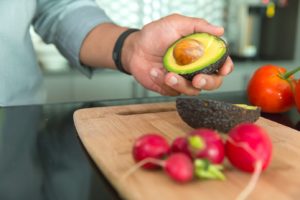 After colostomy surgery, you will want to give yourself time to adjust to the ostomy bag. This includes modifying your diet post-surgery, and even limiting some foods until after you’ve completed your recovery.
After colostomy surgery, you will want to give yourself time to adjust to the ostomy bag. This includes modifying your diet post-surgery, and even limiting some foods until after you’ve completed your recovery.
In most cases, your doctor will recommend a special diet to help facilitate healing and avoid irritation. You should always follow your doctor’s specific recommendations.
Foods to Avoid After Colostomy Surgery
When you’re are recovering from a colostomy, you should avoid foods that can aggravate the intestines and colon. In most cases, a member of your healthcare team will give you a list of foods to avoid after surgery. These foods often include:
- The skin of raw fruits
- Certain raw vegetables
- High-fat and greasy foods
- Processed foods
- Fried foods
- Beans and other legumes
- Spicy foods
- Alcoholic drinks like beer or wine
Your doctor or dietician will give you a timeline for when or if you can resume incorporating these foods into your diet.
What Are the Foods to Eat After Surgery?
While you recover from your colostomy surgery, you should opt for foods that are easy to digest and will not tax your intestines and colon. Your healthcare team will provide you with more information on what you can eat, as well. That list might include:
- Non-fat or low-fat milk or lactose-free dairy products
- Cheese
- Peeled fruit
- Well-cooked, skinned vegetables and skinned fruits
- Low-fiber foods like white pasta or bread
- Pulp free juice
- Yogurt
- Broth
- Eggs
- Lean proteins
- Fruit juice without pulp
Best Eating Practices After a Colostomy Surgery
In addition to avoiding certain foods after surgery, you may also need to change your eating habits to make food easier to absorb. Before you are discharged, a member of your healthcare team will probably discuss best practices for eating, which include:
- Drinking at least 2 liters of liquids per day. Remember to drink non-carbonated liquids.
- Eating small meals often. You should try to have six small meals throughout the day instead of having three large meals.
- Eat slowly and chew your food well. Digestion begins with chewing, so the more you chew, the easier it will be for your other organs to digest.
Once your care team permits, introduce foods that you’ve avoided after surgery back into your diet one at a time. This will help you quickly identify any potential new food sensitivities.
Changes in What You Want to Eat
You may also find that some foods you enjoyed before the procedure might make you sick now. Common food intolerances after colostomy surgery often include meals high in fiber or high in fat. If you notice that you have a large amount of diarrhea, bloating, gas, or feel generally ill or uncomfortable after consuming a particular food, limit that food in the future or consult your healthcare team.
If food makes you very ill, or if you experience diarrhea that lasts more than 24 hours or is accompanied by a fever of 100.4 F or higher, call your doctor.
For products to help make your transition into ostomy care easier, visit Simply Medical today. From barrier paste and wipes to ostomy pouches and adhesive remover, we’ve got you covered.

